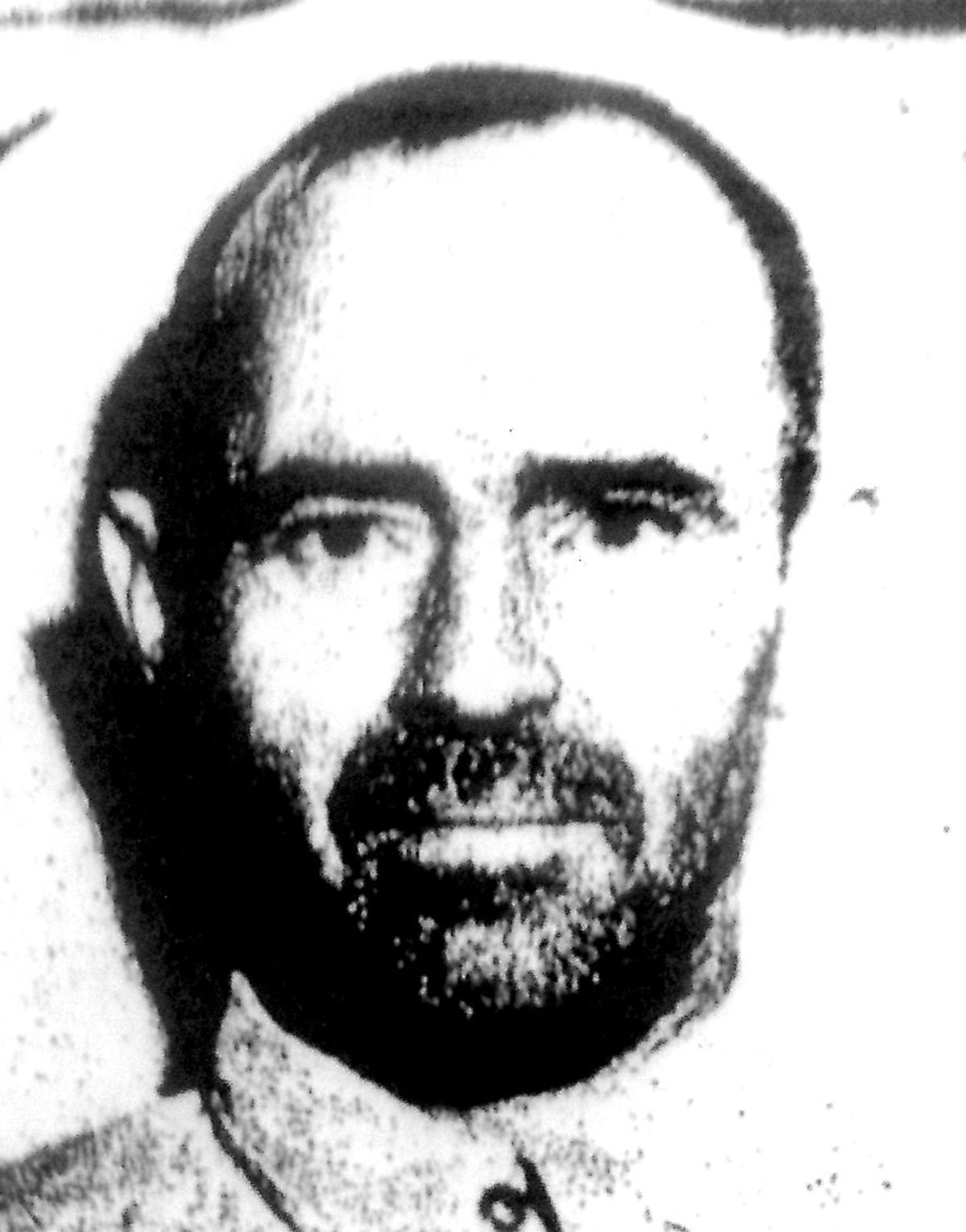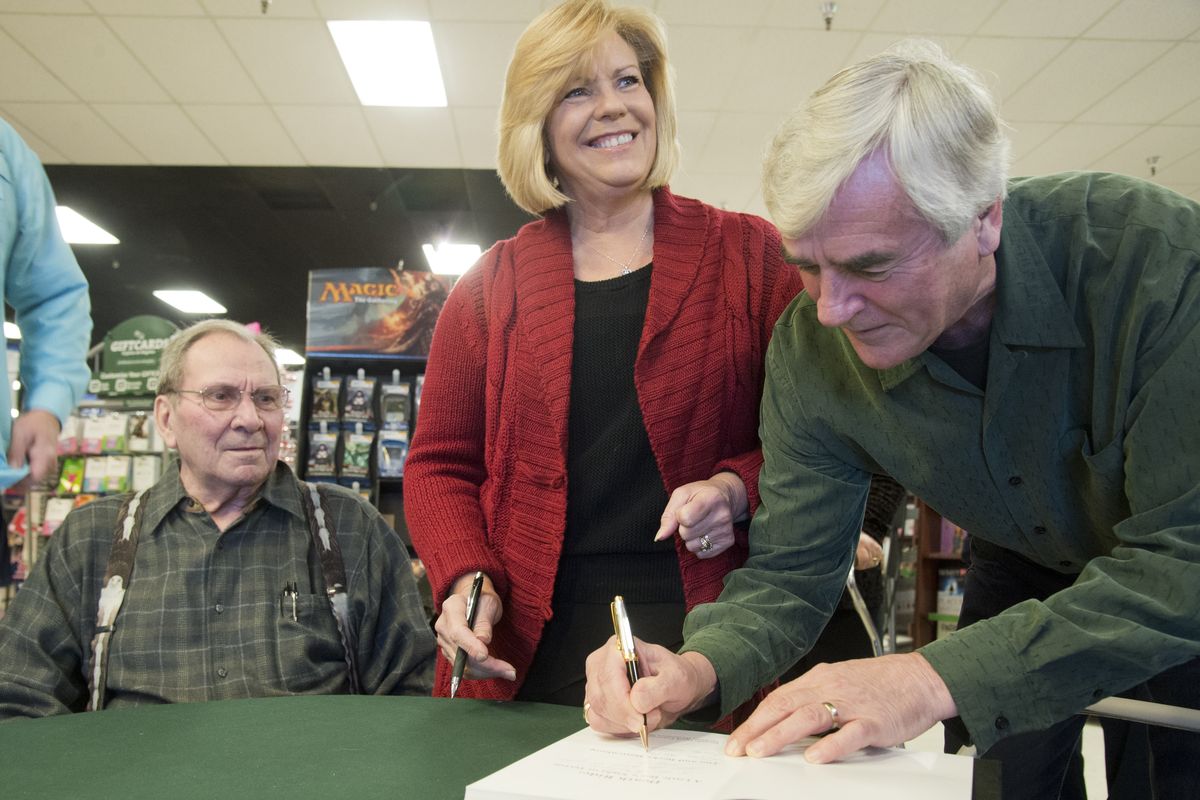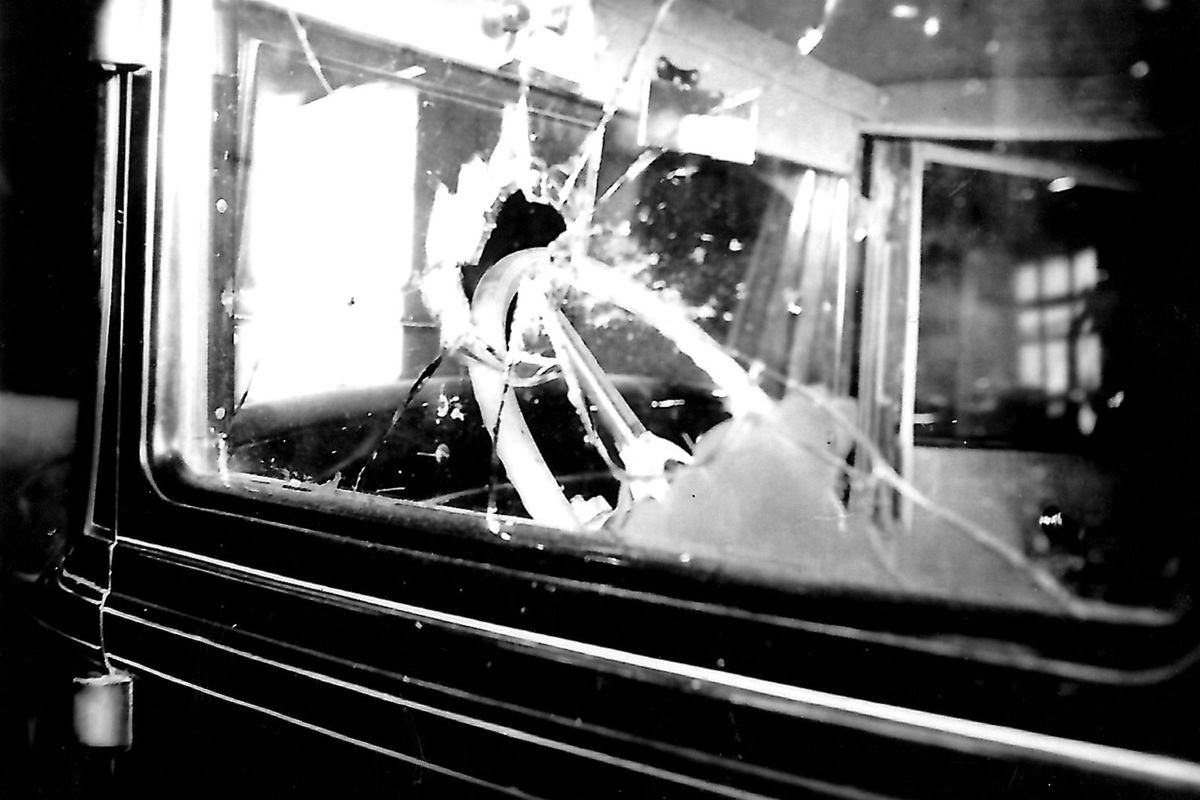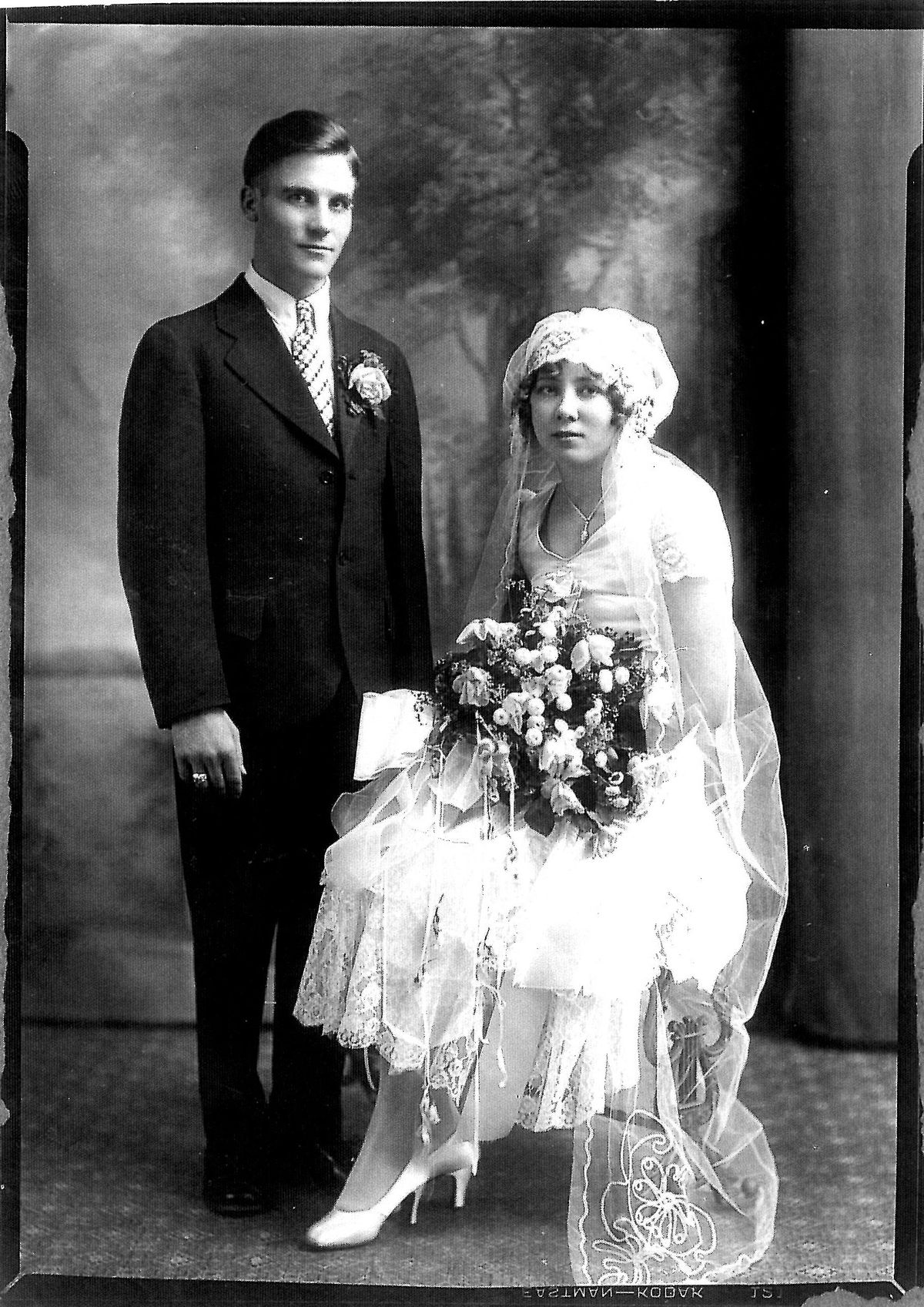New book tells story of 1937 double homicide, and the boy who survived
This evidence photo shows a bullet hole in the window of the family car where Frank Robideau killed Mike and Frieda Kuntz in front of their son, Larry.
Larry Kuntz still has the latch he used to escape from a grain elevator in Wheat Basin, Montana, on the worst night of his life.
He was just 5 years old on a cold night in 1937 when a local wheat farmer shot both his parents in the family’s 1930 Chevrolet, then pistol-whipped him and left him for dead. The next morning he awoke in the back seat dazed and covered in blood.
His story is the subject of a new book written by a Spokane Valley couple called “Death Ride: A Little Boy’s Night of Terror.”
Aside from a handful of newspaper articles about the double murder, it’s the first time Kuntz, now 82, has spoken publicly about the crime that made national headlines more than 75 years ago.
Co-authors Tim and Becky Hattenburg spent nearly two years digging through court records, tracking down historical photos and interviewing eyewitnesses to bring Kuntz’s story to life.
Tim Hattenburg used to teach history at North Pines Middle School in Spokane Valley, and the couple first learned of Kuntz’s story from a former student’s father.
“It kind of took on a life of its own,” Becky Hattenburg said of the project. “We knew people in this book better than we know our neighbors.”
Story is about more than a murder
Kuntz is retired from a 51-year career as a pharmacist in Spokane. He said many of his regular customers followed when he moved from a Thrifty drugstore on North Division Street to a new location in the Valley in 1971.
“I don’t know what I did to deserve that,” he said, sounding almost sheepish.
His wife, Janet, said he would deliver medications to patients at home when they couldn’t make it to the pharmacy.
Though he’s soft-spoken by nature and doesn’t like to call attention to himself, Kuntz said he’s been pleased by the book.
“I could do without the notoriety, but I’m not going to fight it,” he said.
The story of the Kuntz murders, as told by the Hattenburgs, is about more than crime. Their book offers a glimpse into the difficult life of Depression-era wheat farmers.
Kuntz’s parents, Mike and Frieda, moved to Wheat Basin from North Dakota in the spring of 1937 so Mike could take a job managing one of the two grain elevators in the town bounded by fields, forest and the rugged Crazy Mountains to the west.
He didn’t relish relocating away from family, but a job was a hard thing to come by, especially in the rural West.
Though the Kuntzes hadn’t been in town long, they were reasonably close with the neighboring family of farmer Frank Robideau.
Robideau’s son, Richard, was Larry’s playmate, and his wife, May, had asked Freida Kuntz to help deliver her fourth child.
Deep in debt with a baby on the way, Robideau was becoming an increasingly desperate man by the fall of 1937. The area’s wheat harvests had been poor for three years running, starved by drought. Robideau was running into especially hard times. His combine had been repossessed before harvest, forcing him to take on the extra expense of hiring manual labor to bring in the wheat, and he had already borrowed against his crop.
Newspaper accounts differ somewhat, but it’s generally agreed that Robideau arrived at the grain elevator the day after Thanksgiving, Nov. 26, 1937, and demanded Mike Kuntz write him a check for grain he had stored at the elevator. Kuntz declined, citing an existing lien on the wheat.
Robideau became angry and drew a gun.
He forced Kuntz to write checks made out to various farmers in the area, which he intended to endorse and cash. He also warned Kuntz not to go to the authorities in the county seat of Columbus – a 26-mile drive away.
Shortly after Mike Kuntz arrived home, Robideau showed up on the family’s doorstep, still upset and brandishing his gun. He told the family they were “going for a drive” and ordered Kuntz to drive while he sat in the back seat with the boy.
About 10 miles outside of town, Robideau told the boy’s father to pull over. He pulled the gun from inside his jacket and shot Mike Kuntz through the head. That’s when Frieda started fighting.
“Soon as he shot my dad, she came over the back of the seat and grabbed the gun,” Kuntz said. In the struggle, Frieda forced Robideau to fire three missed shots. He used his last bullet to shoot her in the heart.
Then he came looking for Larry Kuntz.
“She told me to run. It was 7 or 8 o’clock at night, dark, in the middle of the county road. I didn’t know where I could have run to,” Kuntz recalled. Robideau caught up with him quickly and beat the boy with his pistol, dragging him to the car as Kuntz slowly slipped into unconsciousness.
He still credits his mother with saving his life.
“If she hadn’t made him expend those other bullets, he’d have shot me,” he said.
The next morning, Kuntz woke up with a pounding head in the back seat of the family car. He could see his parents weren’t moving.
As he came to, he realized Robideau had parked the car inside the grain elevator Kuntz’s father managed – a choice that likely kept the boy warm enough to survive a November night when the temperatures sank to the low 20s.
Kuntz remembered watching his father use an inside latch to open the elevator doors so he could load sacks of grain into railroad cars. Using what little strength he had left, he unlatched the hook holding the door in place and escaped, stumbling down the road toward the town’s general store before collapsing.
Murders were solved quickly
As the Hattenburgs researched and uncovered bits of family history, they found themselves growing close to the Kuntzes. They’re proud they’ve been able to find missing bits of the story and help preserve a piece of Kuntz’s family history.
The Kuntzes are effusive about the relationship that’s grown between them.
“We’ve been best of friends since the first time they walked in the door,” Janet Kuntz said.
The Hattenburgs took special pride in bringing the Kuntz family to life, using Larry’s early memories of his parents.
“Larry’s parents were really never anything but victims. There wasn’t a lot out there about them,” Becky Hattenburg said. Through the couple’s research, readers learn that Larry’s mother, Freida, was an accomplished cook with a penchant for one-pot casseroles. She lamented that the poor soil in Stillwater County kept her from having a vegetable garden.
Mike, Larry’s father, was a fun-loving man who spent Sundays after church reading the comics with his young son, and sometimes dressed up as actor Charlie Chaplin, dangling out the window at the top of the grain elevator for comic effect.
“You could tell, just even in the photos, that they were a really special little family,” Becky Hattenburg said.
The Kuntz murders were solved quickly by Stillwater County Sheriff Frank Murphy. Robideau tried to cast blame on a pair of hitchhikers who were seen traveling through town the night before, but investigators found stubs from the checks he forced Mike to write in the grain elevator. Robideau couldn’t provide a verifiable alibi for the night of the murders, either, and he’d been seen at the hospital where Kuntz was recovering, seeming menacing as he whispered in the boy’s ear.
By the time Kuntz was conscious enough to identify Robideau as the killer, it came as no great surprise to the sheriff. Robideau pleaded guilty and was sentenced to hang in Columbus.
Following Robideau’s arrest, the sheriff submitted his fingerprints to the FBI. Shortly after, the bureau came back with a surprising revelation – the prints were a match for one Joseph Liberty, an escapee from a New York prison who had been convicted of a brutal double murder. He’d apparently fled west and changed his name.
About 400 people attended the execution, including law enforcement officers from San Bernardino, California, and Cody, Wyoming. The Hattenburgs suspected Robideau may have committed crimes in those states, but were never able to turn up any evidence.
Just before 1 a.m. on Jan. 15, 1938, less than two months after shooting the Kuntzes, Robideau climbed the steps to the gallows.
The Hattenburgs report his final statement was, “If you have any sympathy to show, don’t show it to me. Please show it to my wife and my family, as they need it.”
When Kuntz visited Columbus in 1953, he stopped by the town bar and told the bartender who he was. Apparently, Robideau’s execution was still fresh in his memory.
“The guy said, ‘My God, that’s the busiest day we’ve had since then!’ and bought me a beer,” Kuntz said.
‘The unimaginable happened to him …’
Wheat Basin, Montana, is now a ghost town, dried up. The land that was once home to nearly 1,000 people is owned by Ken Mesch, a Columbus resident who wanted space to hunt with his falcons.
After recovering in the hospital, the young Kuntz was sent back to Richardton, North Dakota, where his maternal grandmother and his father’s brother shared custody. For several years, he struggled in school and had nightmares. Sometimes, he’d break down at school and have to go home early.
“Something would hit me and they’d have to call my aunt,” he said.
The nightmares subsided when he was about 9, and Kuntz has since worked to put his parents’ murders behind him.
“I don’t feel like I was cheated or anything like that,” he said, since he was raised by loving relatives. “It’s not doing me any good, so why not let it go?”
He rarely speaks about the night he spent alone and scared in his family’s car, though he still has a small scar under his right eye from the encounter.
“For years we didn’t talk about it because we didn’t want to bring back hurtful memories,” Janet Kuntz said.
Then, in 2010, Kuntz received an invitation from Mesch to come back to town for a reunion. Mesch got in touch via Kuntz’s grandson, who had been digging into family history.
The Kuntzes visited the Museum of the Beartooths in Columbus, which had a display about the murders, and spent hours walking through the exhibits.
Kuntz also took Janet to Wheat Basin and stopped at the site where the grain elevator stood before it burned down in the 1990s.
“I went right for the elevator and I was looking for the latch,” Kuntz said. He didn’t find it, but came back the next day with shovels and was able to dig it up from the ashes of the grain elevator.
Since that visit, Kuntz’s story has been retold in a handful of Montana newspapers, and he’s gradually begun opening up about his past. Through Mesch, he was introduced to Cassandra Norman, the great-granddaughter of Frank Robideau, who’s 36 and lives in Minneapolis.
Norman had a vague notion that her great-grandfather had killed someone but was never told the story directly as a child. She’d pieced together a version of it from listening to her father talk to his brothers when they came to visit and remembers thinking the killing was in self-defense, though she knew Robideau had hanged for it.
So when a 2010 article in the Billings Gazette came out about Kuntz’s journey to reconnect with his past, she decided to visit the museum in Columbus and learn more.
She sees Robideau as a cruel, violent man, but also wonders about his motivations for fleeing out West.
“From what we understood, it was a very hard time, and it almost seemed like he was trying to make a new life for himself, trying to be an honest man,” she said. “He went to Montana to be a farmer. Is there a harder place in the country to do that?”
Through her trip to Columbus, she met Mesch, who introduced her to the Kuntzes.
“They were super-friendly, interested to hear my story and what happened to the subsequent kids,” she said. “It was almost an instant bond, and it was so lovely to see what an amazing person he had become.”
Kuntz calls Norman a “real sweetheart” and stays in touch. They speak on the phone at least every few weeks, and her family visits periodically – once to attend the Kuntz family pumpkin-carving contest.
Norman said she’s still impressed by Kuntz’s resilience.
“The unimaginable happened to him; he just became this amazing man who everybody loves. I don’t think there’s a person who could not like the guy.”
Now that he’s befriended Norman, Kuntz feels his story of childhood tragedy has come full circle. Having “Death Ride” published has brought him some closure, too.
“All in all, I’ve had a pretty good life,” he said.
Tim and Becky Hattenburg joke that they don’t quite know what to do with themselves now that their work on the book is over. But they’re happy to have been able to share Kuntz’s story and get to know his family in the process.
“They were so open with us, sharing their memories as well as their photos,” the Hattenburgs write in their introduction. “Larry didn’t think his story was special enough to have a book written about it, but he was willing to let us try.”





